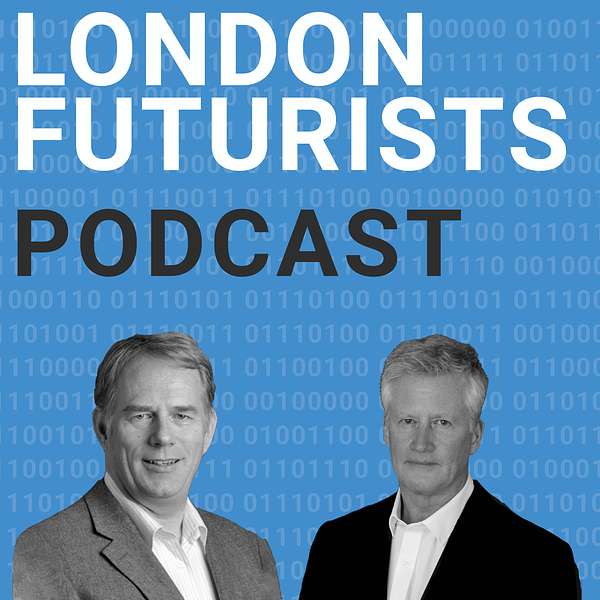
London Futurists
Anticipating and managing exponential impact - hosts David Wood and Calum Chace
Calum Chace is a sought-after keynote speaker and best-selling writer on artificial intelligence. He focuses on the medium- and long-term impact of AI on all of us, our societies and our economies. He advises companies and governments on AI policy.
His non-fiction books on AI are Surviving AI, about superintelligence, and The Economic Singularity, about the future of jobs. Both are now in their third editions.
He also wrote Pandora's Brain and Pandora’s Oracle, a pair of techno-thrillers about the first superintelligence. He is a regular contributor to magazines, newspapers, and radio.
In the last decade, Calum has given over 150 talks in 20 countries on six continents. Videos of his talks, and lots of other materials are available at https://calumchace.com/.
He is co-founder of a think tank focused on the future of jobs, called the Economic Singularity Foundation. The Foundation has published Stories from 2045, a collection of short stories written by its members.
Before becoming a full-time writer and speaker, Calum had a 30-year career in journalism and in business, as a marketer, a strategy consultant and a CEO. He studied philosophy, politics, and economics at Oxford University, which confirmed his suspicion that science fiction is actually philosophy in fancy dress.
David Wood is Chair of London Futurists, and is the author or lead editor of twelve books about the future, including The Singularity Principles, Vital Foresight, The Abolition of Aging, Smartphones and Beyond, and Sustainable Superabundance.
He is also principal of the independent futurist consultancy and publisher Delta Wisdom, executive director of the Longevity Escape Velocity (LEV) Foundation, Foresight Advisor at SingularityNET, and a board director at the IEET (Institute for Ethics and Emerging Technologies). He regularly gives keynote talks around the world on how to prepare for radical disruption. See https://deltawisdom.com/.
As a pioneer of the mobile computing and smartphone industry, he co-founded Symbian in 1998. By 2012, software written by his teams had been included as the operating system on 500 million smartphones.
From 2010 to 2013, he was Technology Planning Lead (CTO) of Accenture Mobility, where he also co-led Accenture’s Mobility Health business initiative.
Has an MA in Mathematics from Cambridge, where he also undertook doctoral research in the Philosophy of Science, and a DSc from the University of Westminster.
London Futurists
Developing responsible AI, with Ray Eitel-Porter
As AI automates larger portions of the activities of companies and organisations, there's a greater need to think carefully about questions of privacy, bias, transparency, and explainability. Due to scale effects, mistakes made by AI and the automated analysis of data can have wide impacts. On the other hand, evidence of effective governance of AI development can deepen trust and accelerate the adoption of significant innovations.
One person who has thought a great deal about these issues is Ray Eitel-Porter, Global Lead for Responsible AI at Accenture. In this episode of the London Futurist Podcast, he explains what conclusions he has reached.
Topics discussed include:
*) The meaning and importance of "Responsible AI"
*) Connections and contrasts with "AI ethics" and "AI safety"
*) The advantages of formal AI governance processes
*) Recommendations for the operation of an AI ethics board
*) Anticipating the operation of the EU's AI Act
*) How different intuitions of fairness can produce divergent results
*) Examples where transparency has been limited
*) The potential future evolution of the discipline of Responsible AI.
Music: Spike Protein, by Koi Discovery, available under CC0 1.0 Public Domain Declaration
Some follow-up reading:
https://www.accenture.com/gb-en/services/applied-intelligence/ai-ethics-governance
Elevate how you lead with insight from today’s most influential executives.
Listen on: Apple Podcasts Spotify

